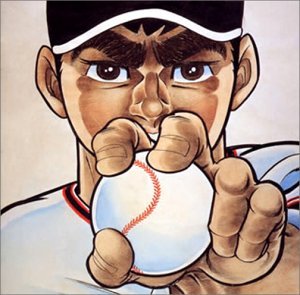Spending too much time researching and not enough writing of late. In order to write that promised piece on the early 90s TV anime malaise, I’m now gathering information on anime from 1970. May have over shot my target a little there.
The following thoughts might find themselves in the even longer promised “Science Fiction is the Arthritis Crippling the Anime Industry” post, but then again I may never finish that, so might as well use them here while they’re fresh in my mind.
Going back through titles both pre- and post-1977 it struck me there’s threads of discussion that are perennially under-discussed in Anglophone online fandom outside of a few places like Mike Toole’s new column on Anime News Network or Ben Ettinger’s site.
When you do see discussion of older shows it has a tendency towards the sci-fi end of things. It’s not surprising given that anime otaku-dom as we know it likely has its birthplace in Yamato, both in Japan and the US. Your version of history is coloured by what you were exposed to. In the UK you’d be probably be breaking some kind of law if you failed to mention Dogtanian or Mysterious Cities of Gold in an anime history article. Because of that colouring of formative experience, some historical articles end up feeling like they are writing about the fandom, while ostensibly discussing the product, but that’s hardly unique to anime and manga fandom.
However, there’s a couple of big areas that struck me as being under discussed and they are…
Baseball

Forget giant robots or magical girls, there is one genre that weathers all storms in the audience’s taste. Baseball. There are so many big baseball series, both classic and modern, that I’m certain you could easily run a blog just about baseball anime/manga. In fact I’m surprised there aren’t any already. I tried searching for them, but while I found shows like Major discussed on baseball forums, I couldn’t find any dedicated baseball anime/manga blogs.
Possibly the reason for this is that baseball itself attracts an audience with a certain degree of nerdish obsession, given that it lends itself to the accrual and processing of statistics, and those people are already expending their blogging energies on REAL baseball.
Gags

Now I do write about this occasionally myself. I’ve discussed some recent gag manga adaptations and various shows from Wonderful among others. Not to mention the vast amount of coverage I’ve given to Urusei Yatsura. However I feel there’s some pretty severe gaps in my knowledge, for instance I’d love to see more of the second Tensai Bakabon series. I tend to find myself judging all long form gag anime against prime Oshii/Ito period Urusei Yatsura and all 4 panel gag manga adaptations against Akitaro Daichi’s adaptations, and as good as they are, I’m not sure they’re the real benchmarks.
There’s a vast amount of gag manga and anime that just falls under the radar, even incredibly popular series. And while there’s plenty being written about modern gag strips and anime like Hetalia or K-On, is often without a sense of the genre’s history. It often feels like Azumanga Daioh is year dot for some of the audience. As we’re seeing more and more of a move towards this genre again, particularly as web-anime and web-manga expand, a discussion of the genre in a historical context would be helpful.
Am I right? Are these under-discussed? Or are there people out there writing about these areas and I’m just sleeping on them?
2. Gags are one of those translation-abysses that makes English-language blogging nigh impossible. On the other hand, I don’t think that necessarily precludes someone from writing about them. I guess if I had to guess why there are little to few blogs focused on the comedy side of anime and manga, it would be that it takes someone who takes it seriously enough to write about it, and no such a person would be qualified to write about something not to be taken so seriously.
1. The whole “real baseball” angle is good. Same reason why airsoft fans in the US are far and few in between. But on the other hand there is an airsoft fanbase in the US, and if I had to guess as to why there are few sports anime/manga blogs, it would be because JAPANESE sports drama is really more about the drama and not about the sport, which generally turns me off (as a baseball fan, tho I don’t qualify as a nerd by any means). I want baseball, I don’t necessarily care about the soap that goes on (don’t really like Major personally).
That said I really like Oofuri.
The thing about gag cartoons, in both comics and animation, is that is if the cartooning is good enough, then translation shouldn’t be that big of an issue.
When I saw Welcome to the Space Show we were laughing all the way through, it’s a funny film, yet when someone asked the producer and director if we were laughing in all the right places, they said there were some gags that were missed due to the translation (or lack thereof). But because it’s funny enough in what the characters do, that really didn’t matter.
It’s the difference between saying a funny thing or saying something in a funny way. If you can tell it in a funny a way, it doesn’t matter what you’re saying.
Unfortunately, when you’re dealing with anime you aren’t always getting that due to budget or lack of talent, and so you are in that translation abyss you mentioned, where the jokes themselves are all there are.
From watching clips of the original Tensai Bakabon and the second series, there’s a gulf between them. I can merrily watch the second without understanding the words because the drawings and action are funny, but the first series is like having teeth pulled. Static, dull layouts and over reliance on dialogue.
What you describe is just something funny. I’m not saying that there’s nothing that could be humorous when coming from a foreign culture and language. One of my very first favorite character from an anime is Izumi from Nadesico, and her brand of humor is not only hard to translate, it’s so-called bad humor. But yeah, I think she’s funny.
The problem about translation is that it limits the types of humor you can blog about. In essence, you can only talk about the stuff that are funny that transcends language, and that’s not a large portion of all the humorous stuff out there. And worse, those sorts of gags are hard to dissect without killing them.